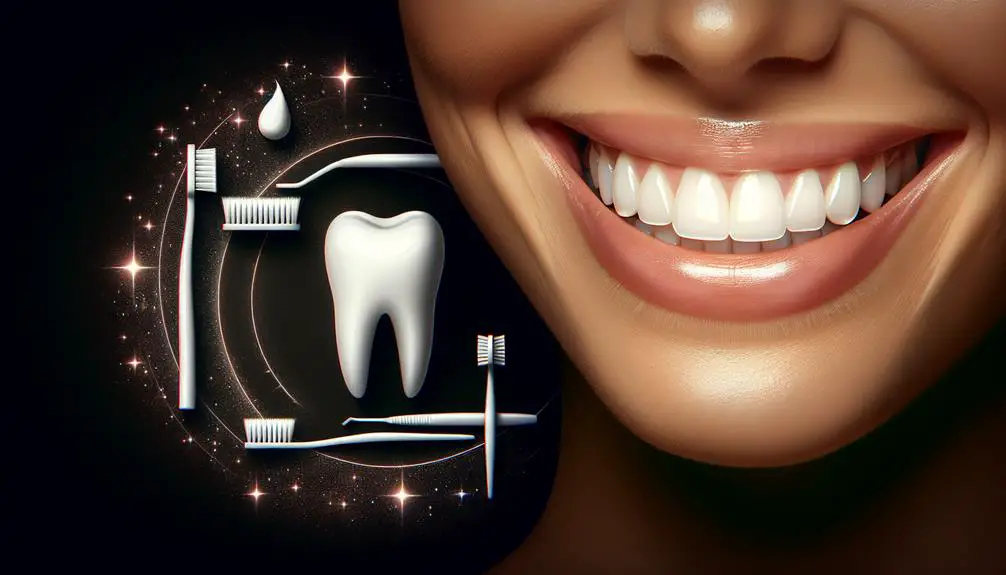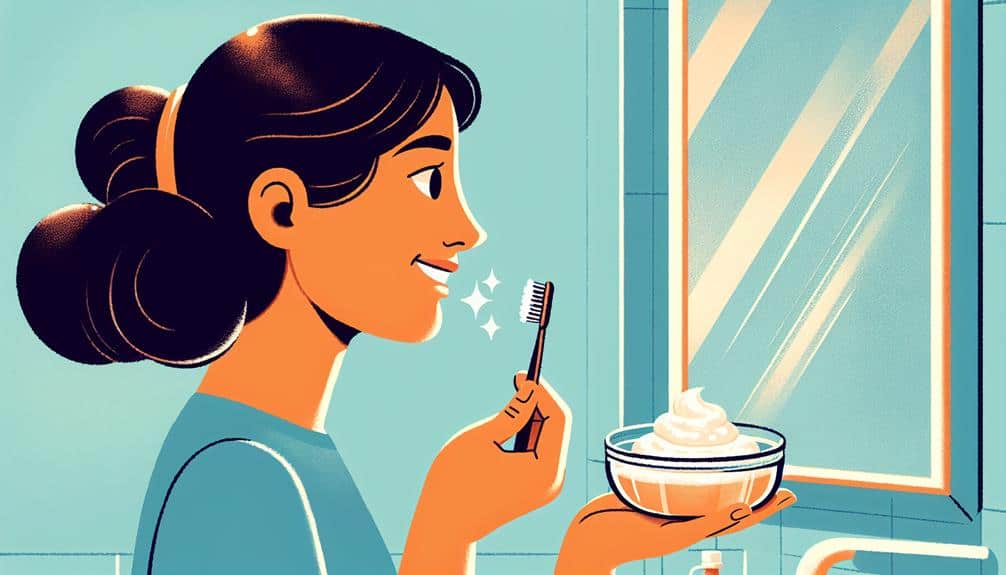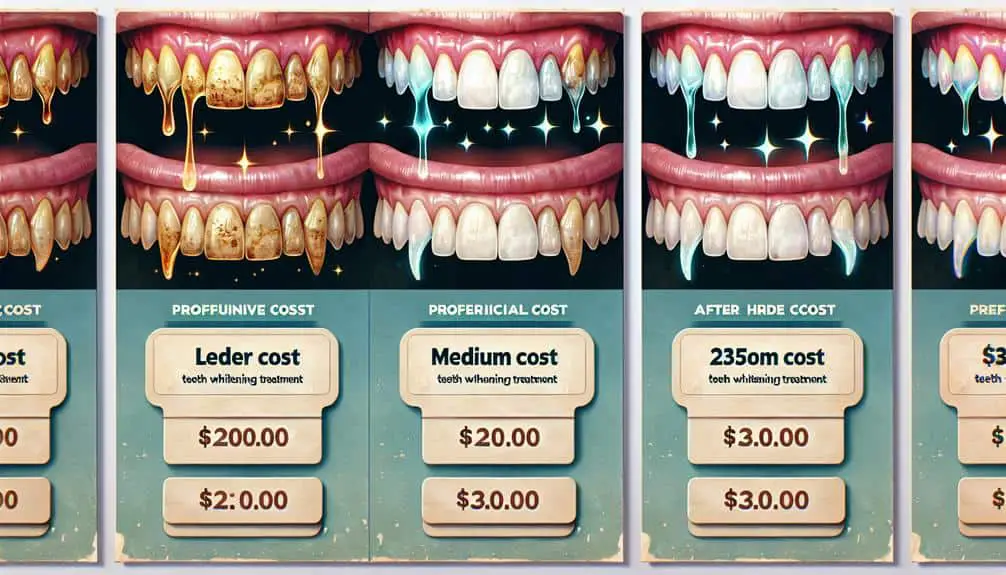Whitening your teeth not only improves your smile but is also closely linked to your oral health. Teeth whitening promotes practicing good oral hygiene, reducing the risk of gum disease by maintaining a regular dental care routine. Alongside preventing gum issues, brightening your teeth supports cavity prevention and overall dental health. Seeking professional guidance guarantees safe and effective whitening, as different products can impact your enamel and gums differently.
Understanding the connection between teeth whitening and oral health is crucial for a healthy, confident smile. Further insights can provide a deeper understanding of how these two aspects are interconnected for your well-being.
Key Points
- Teeth whitening supports gum disease prevention and encourages oral hygiene.
- Good oral care, alongside whitening, helps prevent cavities and maintain healthy gums.
- A bright smile boosts confidence and overall well-being, promoting oral health.
- Seeking professional guidance ensures safe whitening product use and optimal outcomes.
- Different whitening products vary in bleaching agent concentrations, requiring monitored treatment durations.
Importance of Oral Hygiene
Have you ever wondered why oral hygiene is essential for maintaining healthy teeth and gums? Preventive care through proper oral hygiene practices is key in preventing various dental issues. Brushing techniques play a significant role in maintaining oral health.
Effective brushing techniques involve using a soft-bristled brush and fluoride toothpaste. Brushing should be done at least twice a day, in the morning and before bed, for two minutes each time. This guarantees the removal of plaque, a sticky film of bacteria that can lead to cavities and gum disease if not adequately removed. Proper brushing techniques include using gentle, circular motions to clean all tooth surfaces, including the front, back, and chewing surfaces.
In addition to brushing, flossing daily helps remove food particles and plaque from between teeth and below the gumline where a toothbrush can't reach. Incorporating mouthwash into your oral hygiene routine can further enhance preventive care by reducing bacteria in the mouth. By following these brushing techniques and practicing consistent preventive care, you can maintain the best oral health and prevent dental problems in the long run.
Boosted Confidence and Self-Esteem
Maintaining proper oral hygiene not only prevents dental issues but also contributes noticeably to a boost in confidence and self-esteem. When your teeth are white and healthy, you're more likely to engage confidently in social interactions and feel more attractive.
Here are four ways teeth whitening can enhance your confidence and self-esteem:
- Improved Social Interactions: Bright, white teeth can make you feel more comfortable smiling, leading to improved interactions with others.
- Enhanced Attractiveness: A bright smile is often associated with attractiveness, boosting your self-image and how others perceive you.
- Psychological Benefits: Whiter teeth can lead to a positive mindset, improving your overall mental well-being and self-assurance.
- Increased Self-Esteem: Feeling good about your smile can noticeably increase your self-esteem, empowering you in various aspects of your life.
Reduced Risk of Gum Disease
Minimizing the risk of gum disease is vital for maintaining excellent oral health and overall well-being. Teeth whitening can contribute to this by promoting preventive care practices that support a healthy smile. Gum disease, also known as periodontal disease, is a common condition characterized by inflammation of the gums and can lead to more severe issues if left untreated. By improving the appearance of your teeth through whitening procedures, you may be more inclined to maintain a consistent oral hygiene routine, which is essential for preventing gum disease.
Regular teeth whitening treatments can serve as a reminder to prioritize your dental health, encouraging you to brush and floss regularly. This commitment to oral hygiene plays a significant role in reducing the risk of gum disease. Additionally, a healthy smile resulting from teeth whitening can boost your confidence, motivating you to maintain good oral health habits. Ultimately, the connection between teeth whitening and a reduced risk of gum disease highlights the importance of preventive care for achieving excellent oral health.
Enhanced Overall Dental Health
Improving your oral health through teeth whitening not only supports gum disease prevention but also contributes to enhancing your overall dental health. Here's how teeth whitening can enhance your dental health:
- Preventing Cavities: By maintaining good oral hygiene practices alongside teeth whitening, you can help prevent cavities. The removal of stains during the whitening process also eliminates some of the bacteria that can lead to decay.
- Promoting Gum Health: Brightening your smile often goes hand in hand with healthy gums. When you invest in teeth whitening, you're likely to pay more attention to your overall oral care, including gum health.
- Boosting Confidence: A bright smile can boost your confidence, leading you to smile more, which in turn can have positive effects on your mental health and overall well-being.
- Regular Dental Check-ups: Teeth whitening may motivate you to keep up with regular dental check-ups, ensuring that any potential issues are addressed promptly, further supporting your dental health.
Professional Guidance and Safety
For optimal outcomes and safety when undergoing teeth whitening procedures, seeking professional guidance from a qualified dental practitioner is essential. A dental professional can evaluate your oral health status, suggest appropriate whitening products based on your specific needs, and make sure that the treatment duration is suitable.
Product selection is vital as different whitening products contain varying concentrations of bleaching agents, and using the incorrect product can result in adverse effects such as tooth sensitivity or gum irritation. Additionally, the treatment duration should be monitored closely to prevent excessive use of whitening agents, which can damage the tooth enamel and cause long-term harm.
Frequently Asked Questions
Can Teeth Whitening Treatments Cause Damage to the Enamel of the Teeth?
Teeth whitening treatments can potentially damage enamel if not done correctly. It's important to use products that offer enamel protection and to be mindful of whitening sensitivity. Consult with your dentist for safe and effective whitening options.
How Long Do the Effects of Teeth Whitening Treatments Typically Last?
You're thrilled with your pearly whites post-teeth whitening. To maintain that glow, follow maintenance tips like regular brushing and avoid staining foods. Professional touch-ups can extend the effects. With proper aftercare, enjoy the longevity.
Are There Any Side Effects or Risks Associated With Teeth Whitening Procedures?
When considering teeth whitening, be aware of potential sensitivity concerns and the long-term impact on your oral health. Consult with a dental professional to understand any risks or side effects associated with the procedure.
Can Certain Foods and Drinks Affect the Results of Teeth Whitening Treatments?
Want to maintain that bright smile? Foods and drinks like coffee, red wine, and berries can affect whitening results. To prevent stains and prolong whitening, opt for a diet low in pigmented foods.
Is It Safe to Use At-Home Teeth Whitening Kits Without Professional Supervision?
Using at-home teeth whitening kits without professional supervision poses DIY dangers. Seek professional guidance to avoid efficacy concerns and guarantee a positive user experience. Prioritize safety and effectiveness by consulting with a dental expert.



